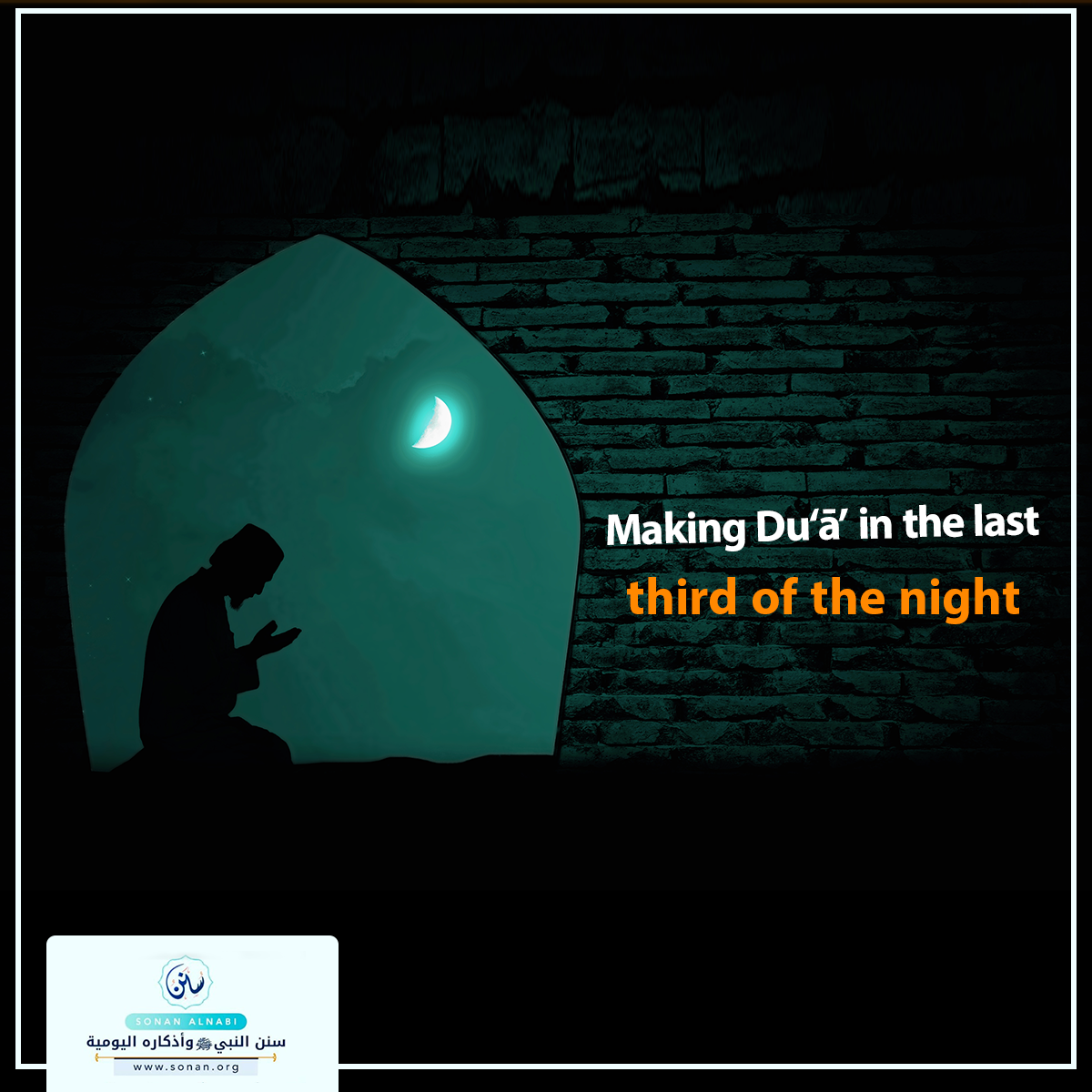Search
Making Du‘ā’ in the last third of the night.

From among the assured Sunan is to make Du‘ā’ at the end of the night. If a
person made Du‘ā’ in Qunoot at the end of the night, that would be enough for him. If, however, he did not, then he still has the opportunity to follow the Sunnah of making Du‘ā’ at the end of the night, as it is a time in which Allāh, the Almighty, descends in a manner befitting His Majesty to the lowest sky.
It has been reported
in the Saheehayn through Abi Hurayrah (ABPWH) that the Prophet (PBUH) said,
“Allāh, Our Lord, Blessed and Exalted, descends every night in a manner befitting His Majesty, to the lowest sky during the last third of the night and says, ‘Who supplicates to me so that I may answer him? Who asks me so that I may grant his request? Who asks my forgiveness so that I may forgive him?’.”
(Al-Bukhāriy no. 1145, Muslim no. 758)
Number 11 of ‘Sunan of Qiyām Il-Layl and Witr’
11) Saying
{ سبحان الملك القدُّوس }
“Glory be to the King and the Holy,”
three times, raising the voice in the third time.
This is proven by the following Hadeeth:
Ubayy Ubn Ka’b (ABPWH) said,
“The Messenger of Allāh (PBUH) used to recite {سَبِّحِ اسْمَ رَبِّكَ الأَعْلَى} ‘Glorify the Name of your Lord, the Most High,’ {قُلْ يَا أَيُّهَا الْكَافِرُونَ} ‘Say: O you disbelievers,’ and {قُلْ هُوَ اللَّهُ أَحَدٌ} ‘Say: He is Allāh, the One,’ in the first, second, and third Rak‘ahs of Witr consecutively. When he makes Tasleem from Witr he would say {سُبْحَانَ الْمَلِكِ الْقُدُّوسِ} ‘Glory be to the King and the Holy,’ three times.”
(Ahmad no. 15354 and An-Nasā’iy no. 1734, and authenticated by An-Nawawiy and Al-Albāniy)
In this Hadeeth,
{سَبِّحِ اسْمَ رَبِّكَ الأَعْلَى}
refers to Chapter 87 of the Holy Qur’ān
,
{قُلْ يَا أَيُّهَا الْكَافِرُونَ} .
refers to Chapter 109 of the Holy Qur’ān
, and
{قُلْ هُوَ اللَّهُ أَحَدٌ}
refers to Chapter 112 of the Holy Qur’ān.
Besides, in the narration of Abd Ir-Rahmān Ibn Abzā, the Prophet (PBUH) would raise his voice in his third time saying
{سُبْحَانَ الْمَلِكِ الْقُدُّوسِ}
‘Glory be to the King and the Holy.’.
Number 12 of ‘Sunan of Qiyām Al-Layl and Witr’
12) Waking up members of the family for Qiyām Il-Layl.
It is recommended for both man and woman to wake up members of their family to offer night prayer, in cooperation to do good.
This is proven by the following Hadeeth:
‘
Ā’ishah, may Allāh be pleased with her, said,
“The Prophet (PBUH) used to pray at night while I lay between him and the Qiblah. When he wanted to perform Witr prayer he would wake me up and I would perform Witr.”
(Al-Bukhāriy no. 512 and Muslim no. 512)
Besides,
Umm Salamah, may Allāh be pleased with her, narrated that the Prophet once woke up and said,
“Subhān Allāh! How many treasures and how many afflictions have been sent down tonight?! Who will wake up the sleeping lady occupants of these rooms (i.e. his wives)? A well-dressed soul in this world may be naked in the Hereafter.”
(Al-Bukhāriy no. 6218)
Number 13 of ‘Sunan of Qiyām Il-Layl and Witr’
13) Avoiding overburdening one’s self in Qiyām Il-Layl.
If one feels tired, he may sit down in his voluntary prayer.
Anass (ABPWH) narrated,
“The Prophet (PBUH) once entered the Mosque and found a rope hanging between two pillars. He said, ‘What is this rope?’ The people said, ‘This rope is for Zaynab. She uses it while praying. When she feels tired she holds on to it to help her keep standing for prayer.’ The Prophet (PBUH) said, ‘Remove the rope. You should pray as long as you feel active, and when you get tired, sit down.’.”
(Al-Bukhāriy no. 1150, Muslim no. 784)
If one feels sleepy, he should take a nap, as this will help him regain his energy, and then he can continue praying.
‘
Ā’ishah, may Allāh be pleased with her, narrated that the Prophet (PBUH) said,
“If one of you feels sleepy while he is praying, then he should rest until his sleepiness is gone. Verily, if one of you is praying while he is sleepy, he might not know if he is asking for forgiveness or cursing himself.”
(Al-Bukhāriy no. 212, Muslim no. 786)
The same also applies to someone who feels sleepy while reciting the Qur’ān at night. The Sunnah is to sleep so when he rises he will be more energetic.
Abu Hurayrah (ABPWH) narrated that Allāh’s Messenger (PBUH) said,
“If one of you wakes up at night to recite the Qur’ān, and found it difficult to recite (due to sleepiness) and he cannot recognize his recitation, then he should sleep.”
(Muslim no. 787)
Number 14 of ‘Sunan of Qiyām Al-Layl and Witr’
14) Compensating for what was missed of the night prayer, next day during day time, but in an even number of Rak‘ahs.
If it was one’s habit to pray Witr three Rak‘ahs altogether and he was not able to offer them due to illness or sleep, it is Sunnah to offer them four Rak‘ahs next day during daytime. If it was his habit to offer five Rak‘ahs at night and he could not offer them due illness or sleep, it is Sunnah to offer six Rak‘ahs next day during daytime, and so on.
‘Ā’ishah, may Allāh be pleased with her, narrated,
“If the Prophet (PBUH) felt sleepy or tired and could not offer the night prayer, he would offer twelve Rak‘ahs next day during daytime.”
(Muslim no. 746

